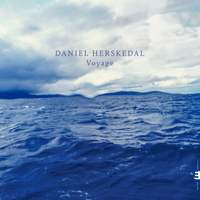Recording of the Week,
Daniel Herskedal - Voyage
 I must admit I groaned slightly at the title of Norwegian composer and multi-instrumentalist Daniel Herskedal’s third album for Edition Records, as countless jazz albums have been called Voyage over the years, often as a default title to excuse indulgent fretless odysseys. However, within the first minute, and having clocked the track titles, I realised that Herskedal’s Voyage is to be taken literally, the album playing out as a series of impressionistic tone poems depicting ships at sea. The effect of the music is to place us onboard, as if seen through the eyes of sailors and passengers, and many of the tracks have a tremendous sense of forward motion, as if we are watching the bow of a ship cutting cut through the waves.
I must admit I groaned slightly at the title of Norwegian composer and multi-instrumentalist Daniel Herskedal’s third album for Edition Records, as countless jazz albums have been called Voyage over the years, often as a default title to excuse indulgent fretless odysseys. However, within the first minute, and having clocked the track titles, I realised that Herskedal’s Voyage is to be taken literally, the album playing out as a series of impressionistic tone poems depicting ships at sea. The effect of the music is to place us onboard, as if seen through the eyes of sailors and passengers, and many of the tracks have a tremendous sense of forward motion, as if we are watching the bow of a ship cutting cut through the waves.
As a composer Herskedal has a knack for writing melodies that feel both new and yet somehow familiar, unmistakably influenced by Norwegian folk music, and underpinned by imaginative and well-balanced arrangements that allow for plenty of improvisation. Herskedal plays tuba and bass trumpet with a remarkable depth of feeling and control for instruments more traditionally regarded as cumbersome, and which little pedigree in a solo capacity. He often treats both instruments as extensions of each other, deftly making use of the timbral similarities and differences to create his own unique sound. His tuba playing offers a good-natured alternative to the usual acoustic or electric bass, and given the nautical theme this adds extra hornpiping resonance. Most of the higher register playing is on the bass trumpet but there are times when he seems to be taking the tuba has high as he can, the vulnerability of its strained timbre in higher registers adding extra emotional resonance. I also don’t recall having heard a tuba swoon and sway quite like this before, the track Cut and Run being a fine example of this.
The Mediterranean Passage in The Age of Refugees movingly attempts to convey just that, flicking between the sensations of elation and fear that asylum seekers must feel on those dangerous journeys, with Maher Mahmoud’s haunting oud representing the individual. Herskedal’s skill as an arranger shines in these pieces, maintaining a constantly shifting tapestry of orchestral colours from just the five players, with Bergmund Waal Skaslien’s viola reinforcing the darker tones of the brass. Eyolf Dale’s rippling piano in tandem with Helge Andreas Norbakken’s percussion serve a crucial role in keeping what could be a bottom-heavy vessel afloat, whilst never merely playing continuo to the strings and horns. Both are spot lit on The Horizon, with Dale’s reflective treatment of the theme buoyed by some delicate cymbal work from Norbakken.
Final track The Lighthouse features Herskedal alone, multitracking tuba and bass trumpet to form a one-man colliery band, lost in its own private reverie. It’s the perfect way to close an album that has largely been occupied with depicting motion. At journey’s end he finally drops anchors in a quiet bay at night, and I’d place it alongside Brian Eno’s Julie with… as a depiction of humans drifting on a calm open sea. This is music that makes genre definitions pointless, as I could imagine this appealing to post-rock fans just as much as jazz – anyone who listens to a band like The National could really enjoy this.
I genuinely don’t have any caveats about Voyage, the more I return to it the more the various layers reveal themselves. It is loosely part of a trilogy, following on from Slow Eastbound Train (2015) and The Roc (2017), which I look eagerly look forward to exploring.
Available Formats: CD, MP3, FLAC, Hi-Res FLAC



